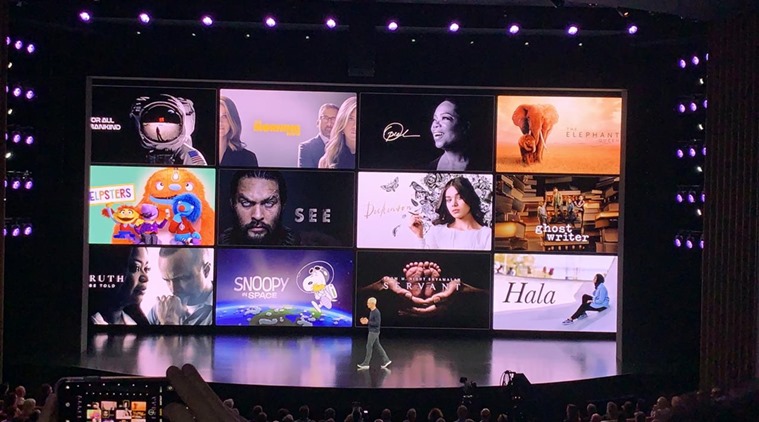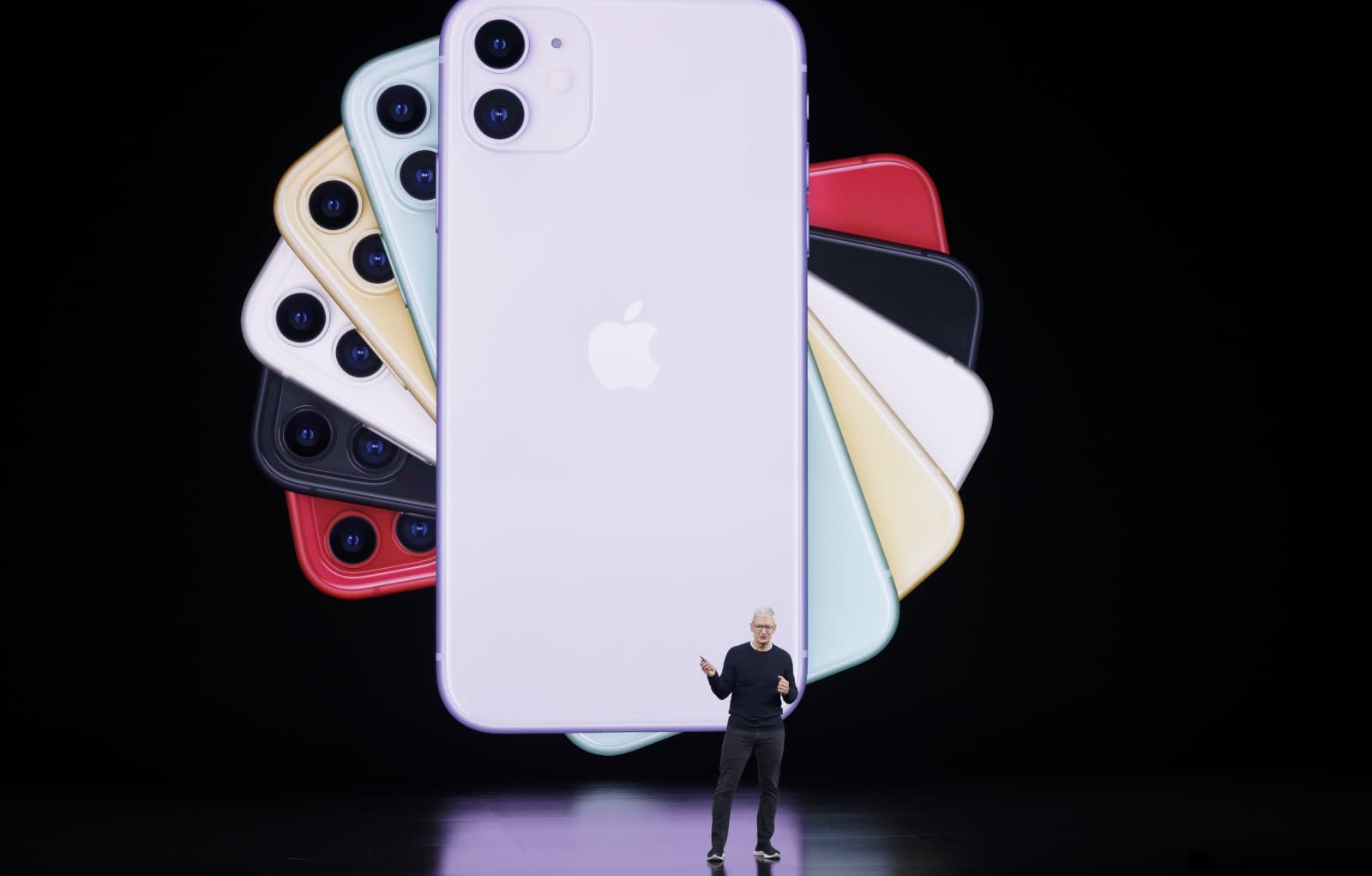Apple unveils iPhone 11, 11 Pro and 11 Pro Max, $5 monthly streaming TV 'Apple TV+'

Buyers of an iPhone, iPad or Mac will get a free year of streaming TV+.
CUPERTINO (Reuters) - Apple Inc caught up with hardware rivals by revealing a triple-camera iPhone, and it rolled out a streaming TV service priced at $5 a month, undercutting Disney and Netflix.
The announcements came at the company’s biggest marketing event, where it unveils its top products for the year ahead, and showcased an aggressive Apple ready to battle on price.
The long-awaited Apple TV+ streaming television service will be available in over 100 countries, starting in November. The service will not be available in China when it launches, nor will the Apple Arcade video game subscription.
Buyers of an iPhone, iPad or Mac will get a free year of streaming TV, potentially drawing hundreds of millions of viewers to the service. That catapults the new service into a rarified group of companies.
“I think the pricing on the Apple TV service was definitely a positive surprise,” said Michael James, managing director of equity trading at Wedbush Securities in Los Angeles. “That’s why you’re seeing the hammering in some of the other video service-related names like Netflix, Amazon and Roku. Clearly, that was a positive that people were happy to hear.”
There was no bundle with Apple Music or other services as some analysts had expected. But Ben Bajarin, an analyst with Creative Strategies, said the TV service, a $5 a month “Arcade” gaming service and the base model iPhone 11, seem designed to draw in users for the longer term.
“We weren’t expecting Apple Arcade and particularly Apple TV to be priced as aggressively as they were,” Bajarin said. “They know once consumers get into their ecosystem, they don’t leave.”
iPhone 11, Pro and Pro Max
An iPhone 11 boasted upgrades including a dual-camera system; longer battery life, a muscular computer chip and better water resistance.
The iPhone 11 will be priced starting at $699 when it hits the market on September 20.
The phone’s camera has a new "ultra-wide" angle lens. Like the other new models, the iPhone is powered by an "A13 bionic" chip made in-house by Apple and infused with machine learning as well as high-performance graphics and processing capabilities.
Apple also introduced an iPhone 11 Pro and larger-screened iPhone 11 Pro Max that will have starting prices of $999 and $1,099 respectively when they are available on September 20.

The Pro line of iPhone has rich "super retina" OLED displays and a third camera on the back for professional quality photos and video, as well as a ramped-up zoom and editing software.
Apple played up an ability to use Pro iPhones for slow motion portrait snippets like selfies that it called "slofies."
None of the iPhones was tailored for the 5G telecom networks starting to roll out.
Apple said its new iPhone 11 will come with two back cameras, including an ultra wide-angle lens and the next generation of microchips, the A13. Prices start at $699, down from last year’s new iPhone that started at $749.
The more expensive iPhone 11 Pro will have three cameras on the back - wide angle, telephoto and ultra-wide. It can create videos with all three back cameras and the front camera at the same time and starts at $999. The iPhone 11 Pro Max with a bigger screen starts at $1,099. The new phones are available to order Friday and will start shipping Sept. 20.

Rivals including Huawei Technologies Co Ltd and Samsung Electronics Co Ltd already sell phones with three cameras on the back. While Apple once tested the upper limits of what consumers would pay for a phone, it is now giving ground on prices, even making older models available at significant discounts to the latest technology.
“Consumers absolutely still care about cameras. That’s why it was surprising over the last couple of years that Samsung and Huawei got the jump on Apple,” said Patrick Moorhead, an analyst with Moor Insights & Strategy. “Apple was playing a bit of catch up, but Apple did bring their game, particularly on the video side of the camera, where I do think they’ll have the leg up.”
Analysts expect Apple will sell around 200 million iPhones in the next year, in addition to other devices, and while many of those will be in China, it ensures at least tens of millions of potential viewers for the subscription service.
Hal Eddins, chief economist for Apple shareholder Capital Investment Counsel, said Apple’s lower priced iPhones “aren’t exciting on the surface, but the low streaming price may suck in some new subscribers.” Apple shares gained 0.8%.
iPad with a Pencil
Apple introduced a seventh-generation iPad with a 10.2-inch display priced at $329. It is set to be in stores starting September 30.

A "must-have" Apple Pencil integrated to work with the iPad touch screen can be used as a controller for creation or productivity. The iPad case is made entirely of recycled aluminum and will have a recently introduced operating system designed specifically for the tablet computers.
Watch time
The fifth-generation Apple Watch has a touch-screen face that is always on so the time and notifications are always viewable, while still being stingy on battery power. Previous generations had the smartwatch face go dark when arms dropped to save on power.
New software features include tracking ambient noise levels to safeguard people’s hearing; an ability for women to monitor menstrual cycles, and a "compass" to keep users properly oriented.

Apple also invited Watch users to volunteer for three new health studies, though data collected will remain anonymous.

Apple Watch Series 5 had a starting price of $399 and was set to be available starting September 20. Apple also reduced the price of Apple Watch Series 3 to a starting price of $199.
TV and Games
Apple’s promised streaming television service -- dubbed TV+ -- will launch internationally on November 1.
The line-up of original shows will include "The Morning Show," "Dickinson," "See," "For All Mankind" and "The Elephant Queen."

Apple chief executive Tim Cook promised more content would be added as it is produced.
The service will be priced at $4.99 monthly, about half of what Netflix charges for access to its large catalogue of content, and is available for viewing using Apple devices or online at tv.apple.com.
Anyone who buys a new iPhone, iPad, Apple TV, iPod touch or Mac computer will get a year of Apple TV+ thrown in free of charge.

Apple TV+ will arrive about two weeks before a new Disney+ streaming television service, which costs $2 more per month.
Apple will open its Arcade game service on September 19, also charging $4.99 monthly. Arcade will have more than 100 exclusive titles for play on Apple’s array of hardware.


